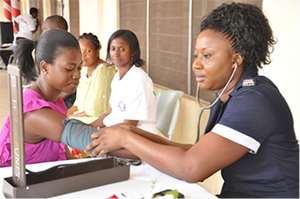
The meaning of primary health care (PHC) has evolved over time and, by examining its origins and later formulations, it is possible to arrive at what is meant by PHC today. It originated as primary medical care where patients met health workers. Implicit in this first contact concept was that patients had common complaints that could be dealt with easily. This early PHC definition had two elements thus the level of services and the activities themselves. Consequently, it denoted an almost "grass-roots" level of health services. At Alma Ata in 1978, the concept was extended. It was maintained that the socioeconomic and political factors affecting poverty and inequality which affected health had to be considered, philosophy of health. Previously PHC focused mainly on rural areas in developing countries, rather than urban slums in these countries. This had led many to see the PHC system as a second class, rural health system. The PHC approach is clarified by examining its 5 underlying principles which are equitable distribution, community involvement, focus on prevention, appropriate technology, and multisectoral approach. Thus, health services should be available to all and community participation will most likely lead to better health. The focus of health care must be on prevention since the greatest strides can be made here. Technology must be appropriate for the locale--it should be cheap, locally available, and cost-effective. Finally, a multisectoral approach recognizes that health is affected by, and affects, housing, education, and public water supplies.
Low participation of community members is the major problem faced by the primary health care. Community participation is one of the main basics of health care. In this case, it does not provide much help to the primary health care facilities. The institutionalized organizations, like Village Development Committees and Ward Development Committees, should pitch in when it comes to solving the health facilities` problems. Unfortunately, the inadequate community mobilization and conflict between communities and the government can`t support the stable development of primary health care. In some communities, people do not cooperate with the health professionals for various reasons, be it cultural, social or religious. Some people choose to stay at home and address their health problems the traditionally. Community participation plays a vital role in health delivery. In their full participation it gives the health care practitioner a solid basis to help deliver a better care in return. Looking at all these, the primary health care lacks which makes it a challenge for them.
Another challenge faced by primary health care is the shortage of physicians and their assistants. In order to meet the primary health care demands of the public, there must be an adequate supply of physicians and their assistants to provide quality care in the locality in which they operate. This is a significant challenge as the health demands are currently increasing more rapidly to outweigh the limiting number of physicians and their corresponding assistants. To manage this issue, several approaches will need to be combined. This may include increasing the number of physicians that are trained, improving workplace systems and increasing the efficiency of care without compromising the quality.
Another problem is the bad inter-sectoral collaboration. According to the instructions of WHO, one of the key elements of primary health care is a good inter-sectoral collaboration. This involves bringing together the components of healthcare in the various communities in which they operate. It means that their confines of operation should achieve a collaboration between sectors, like health, housing, water industry and education. WHO experts inform that health care system in the country mirrors the political system in the country. Therefore, the Federal Government should take the main responsibility for the problems of the health care. It`s especially true with the financing of tertiary health care facilities.
PREPARED BY
TWUM-BARIMAH, ALFRED
LEVEL 200 PHYSICIAN ASSISTANT STUDIES STUDENT
UNIVERSITY OF CAPE COAST




 Critics fear Togo reforms leave little room for change in election
Critics fear Togo reforms leave little room for change in election
 Flooding: Obey weather warnings – NADMO to general public
Flooding: Obey weather warnings – NADMO to general public
 Fire in NDC over boycott of Ejisu by-election
Fire in NDC over boycott of Ejisu by-election
 NDC to outdoor Prof Jane Naana Opoku-Agyemang as running mate today
NDC to outdoor Prof Jane Naana Opoku-Agyemang as running mate today
 Ejisu: CPP seeks injunction to stop April 30 by-election
Ejisu: CPP seeks injunction to stop April 30 by-election
 Dismiss ECG, GWCL, GACL bosses over losses – United Voices for Change tells gov’...
Dismiss ECG, GWCL, GACL bosses over losses – United Voices for Change tells gov’...
 Submit 2023 audited financial statements by May – Akufo-Addo order SOEs
Submit 2023 audited financial statements by May – Akufo-Addo order SOEs
 Current power outages purely due to mismanagement – Minority
Current power outages purely due to mismanagement – Minority
 ECG hoists red flag to fight Ashanti Regional Minister over arrest of General Ma...
ECG hoists red flag to fight Ashanti Regional Minister over arrest of General Ma...
 Mahama’s 24hr economy will help stabilise the cedi; it’s the best sellable polic...
Mahama’s 24hr economy will help stabilise the cedi; it’s the best sellable polic...
